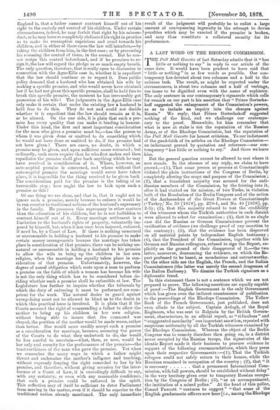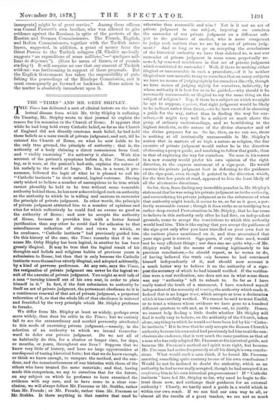A LAST WORD ON THE RHODOPE COMMISSION. T HE Pall Mall
Gazette of last Saturday admits that it "has little or nothing to say " in reply to our article of the same date. It would have been prudent to have said that " little or nothing " in as few words as possible. Our con- temporary has devoted about two columns and a half to the arduous task. The result, as might be expected under• the circumstances, is about two columns and a half of verbiage, too inane to be dignified even with the name of sophistry. The only sentence in our contemporary's rigmarole which calls for remark on our part is his assertion that " Prince Gortsoha- koff suggested the enlargement of the Commission's powers, so as to include an inquiry into the charges against Russia." We reply, that Prince Gortschakoff suggested nothing of the kind, and we challenge our contempo- rary to the proof. Meanwhile, let him remember that what is now at stake is riot the reputation of the Russian Army, or of the Rhodope Commission, bat the reputation of the Pall Mall Gazette for honest criticism. To our indictment of the good-faith of its articles on the Rhodope Commission— an indictment proved by quotation and reference—our con- temporary "has little or nothing to say." And there we leave him.
But the general question cannot be allowed to rest where it now stands. In the absence of any reply, we claim to have proved,—(1), That some person or persons at Constantinople violated the plain instructions of the Congress of Berlin, by completely altering the scope and purpose of the Commission ; (2), that a fraudulent majority was secured for the anti- Russian members of the Commission, by the foisting into it, after it had started on its mission, of two Turks, in violation both of the Resolution of the Berlin Congress and of the action of the Ambassadors of the Great Powers at Constantinople ('Turkey,' No. 39 [1878], pp. 270-1, and No. 49 [1878], pp. 2-3); (3), that this majority refused to test the credibility of the witnesses whom the Turkish authorities in each district were allowed to select for examination ; (4), that in no single case did the Russian or German Commissioner prevent the verification of evidence (we challenge proof of any assertion to the contrary).; (5), that the evidence has been disproved on all material points by independent English testimony ; (6), that the President of the Commission, together with his German and Russian colleagues, refused to sign the Report, ex- plicitly on the ground of their disapproval of it,—the two latter, moreover, denouncing the evidence, on which the Re- port professed to be based, as mendacious and untrustworthy. On the other side are the English,. the French, and the Italian Commissioners (the latter was merely the•second dragoman of the Italian Embassy). We dismiss the Turkish signature as a diplomatic fraud.
In this statement there is not a sentence which we are not prepared to prove. The following assertions are equally capable of proof :—The English Government is the only Government which has given even the indirect countenance of publication to the proceedings of the Rhodope Commission. The Yellow Book of the French Government, just published, does not even allude to the subject. Captain Ardagh, of the Royal Engineers, who was sent to Bulgaria by the British Govern- ment, characterises, in an official report, as " ridiculous " and "exaggerated mendacity" one important assertion, repeated with suspicious uniformity by all the Turkish witnesses examined by the Rhodope Commission. Whereas the object of the Berlin Congress was to remedy disorders then going on, in a district never occupied by the Russian troops, the signatories of the identic Report made it their business to procure evidence in support of the following recommendations, which they press upon their respective Governments :—(1), That the Turkish refugees could not safely return to their homes, while the Russians remained in occupation of the country ; (2), that " it is necessary that a permanent International Com- mission, with full powers, should be established without delay" in the very territory given over to temporary Russian occupa- tion by the Congress of Berlin ; (3), " as an accompaniment, the institution of a mixed police." At the head of this police, Consul Fawcett " ventures to suggest " " that some of the English gendarmerie officers now here [i.e., among the Rhodope
insurgents] might be of great service." Among these officers otherwise than reasonable and wise ? Yet is it not an act of
was Consul Fawcett's own brother, who was allowed to give evidence against the Russians, in spite of the protests of the Russian and German Commissioners. The French, English, and Italian Commissioners, together with the Turkish inter- lopers, suggested, in addition, a grant of money from the Great Powers to the Turkish refugees (M. Challet modestly suggests "an expenditure of some millions,"—" quelques mil- lions do d6penses "). (Does he mean of francs, or of pounds sterling ?) It will surprise no one that any amount of Turkish evidenc3 was forthcoming in support of these proposals. But the English Government has taken the responsibility of pub- lishing the proceedings of the Rhodope Commission, and it must consequently go forward or backward. Some action in the matter is absolutely incumbent upon it.



































 Previous page
Previous page